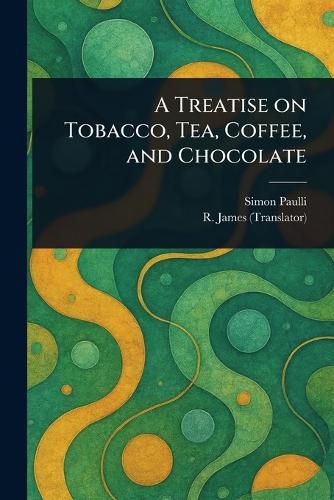Readings Newsletter
Become a Readings Member to make your shopping experience even easier.
Sign in or sign up for free!
You’re not far away from qualifying for FREE standard shipping within Australia
You’ve qualified for FREE standard shipping within Australia
The cart is loading…






This title is printed to order. This book may have been self-published. If so, we cannot guarantee the quality of the content. In the main most books will have gone through the editing process however some may not. We therefore suggest that you be aware of this before ordering this book. If in doubt check either the author or publisher’s details as we are unable to accept any returns unless they are faulty. Please contact us if you have any questions.
Discover the fascinating world of 18th-century indulgence in Simon Pauli's "A Treatise on Tobacco, Tea, Coffee, and Chocolate." This early work delves into the cultivation, preparation, and medicinal properties of these widely enjoyed commodities. More than just a culinary guide, this treatise explores the pharmacological effects of coffee, tea, chocolate, and tobacco, offering insights into their historical uses and perceived benefits.
Explore the botany and practical applications of these plants, from flowers to final product. Whether you're interested in the history of coffee, the rituals surrounding tea, the allure of chocolate, or the social impact of tobacco, this book provides a unique window into a bygone era. A valuable resource for anyone interested in the history of pharmacology, beverages, or simply curious about the origins of everyday pleasures.
This work has been selected by scholars as being culturally important, and is part of the knowledge base of civilization as we know it.
This work is in the public domain in the United States of America, and possibly other nations. Within the United States, you may freely copy and distribute this work, as no entity (individual or corporate) has a copyright on the body of the work.
Scholars believe, and we concur, that this work is important enough to be preserved, reproduced, and made generally available to the public. We appreciate your support of the preservation process, and thank you for being an important part of keeping this knowledge alive and relevant.
$9.00 standard shipping within Australia
FREE standard shipping within Australia for orders over $100.00
Express & International shipping calculated at checkout
This title is printed to order. This book may have been self-published. If so, we cannot guarantee the quality of the content. In the main most books will have gone through the editing process however some may not. We therefore suggest that you be aware of this before ordering this book. If in doubt check either the author or publisher’s details as we are unable to accept any returns unless they are faulty. Please contact us if you have any questions.
Discover the fascinating world of 18th-century indulgence in Simon Pauli's "A Treatise on Tobacco, Tea, Coffee, and Chocolate." This early work delves into the cultivation, preparation, and medicinal properties of these widely enjoyed commodities. More than just a culinary guide, this treatise explores the pharmacological effects of coffee, tea, chocolate, and tobacco, offering insights into their historical uses and perceived benefits.
Explore the botany and practical applications of these plants, from flowers to final product. Whether you're interested in the history of coffee, the rituals surrounding tea, the allure of chocolate, or the social impact of tobacco, this book provides a unique window into a bygone era. A valuable resource for anyone interested in the history of pharmacology, beverages, or simply curious about the origins of everyday pleasures.
This work has been selected by scholars as being culturally important, and is part of the knowledge base of civilization as we know it.
This work is in the public domain in the United States of America, and possibly other nations. Within the United States, you may freely copy and distribute this work, as no entity (individual or corporate) has a copyright on the body of the work.
Scholars believe, and we concur, that this work is important enough to be preserved, reproduced, and made generally available to the public. We appreciate your support of the preservation process, and thank you for being an important part of keeping this knowledge alive and relevant.